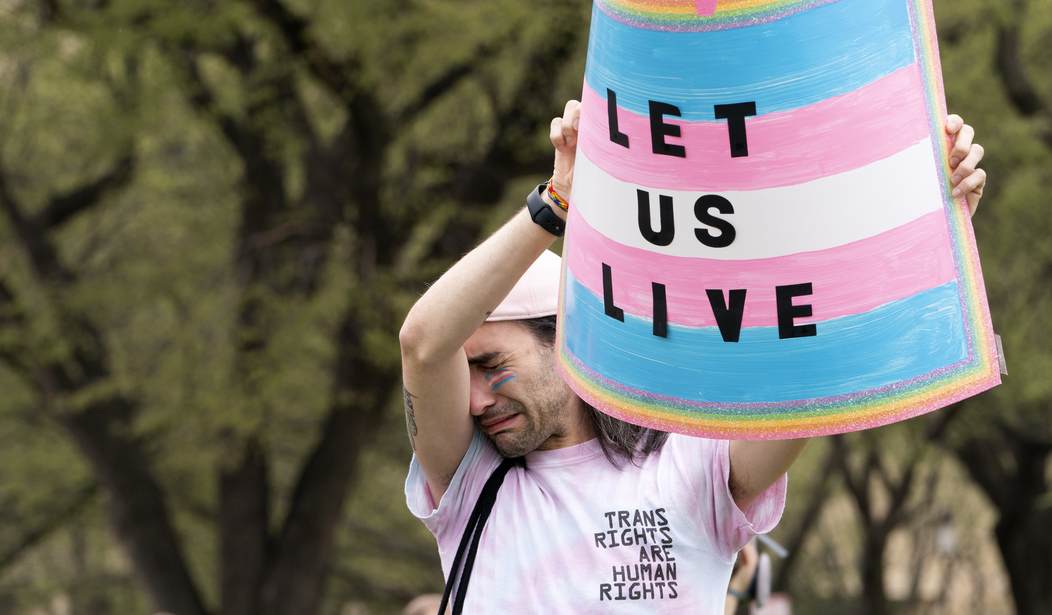Science has a rigor to it that separates it from other intellectual pursuits. The scientific method has been in use for 600 years and has given us answers to some of life's greatest mysteries.
One demand made by good science is that any postulate must have the ability to withstand scrutiny. That means any theory must pass muster with a scientist's peers and, just as importantly, the results must have the capability of being duplicated by others.
A U.S. doctor carried out a U.S. government-funded study, beginning in 2015, that followed 95 children to measure the effectiveness of puberty blockers in improving their mental health. The study was supposed to be a follow-up to a Dutch study earlier this century that showed puberty blockers improving the mental health of gender-dysphoric kids.
That one study was used to justify giving puberty blockers to children. Based on that study, the Tavistock clinic in England treated thousands of children for years.
In the end, the Dutch study couldn't be duplicated. The Tavistock clinic that treated gender-dysphoric children shuttered in 2022 after an exhaustive study showed using puberty blockers wasn't effective at relieving the mental distress of gender-dysphoric kids. The study was delayed for nine long years due to the fear by trans advocates that it would be used in a scientific way to disprove theories of how to treat transgender youth.
The U.S. study suffered a similar fate. It found no improvement in the mental health of the 95 children, and the results have yet to be published.
The U.S. doctor leading the NIH study, Dr. Johanna Olson-Kennedy, told the New York Times that she worried the study would be “weaponized” by critics of doctors using puberty blockers to treat transgender kids, so she delayed publishing the results.
Olson-Kennedy says that the results are probably due to the fact that the "children were already doing well," according to the New York Times. “They’re in really good shape when they come in, and they’re in really good shape after two years,” said Dr. Olson-Kennedy, who runs the country’s largest youth gender clinic at Children’s Hospital Los Angeles.
But the Times notes that her statement is belied by an earlier description of that contradicts Olsen-Kennedy's observation. One-quarter of the children were "depressed or suicidal," according to the Times.
“I do not want our work to be weaponized,” Olson-Kennedy said. “It has to be exactly on point, clear and concise. And that takes time.”
Allow me to translate: I'll publish the study when the political situation turns in our favor.
She said that she intends to publish the data, but that the team had also been delayed because the N.I.H. had cut some of the project’s funding. She attributed that cut, too, to politics, which the N.I.H. denied. (The broader project has received $9.7 million in government support to date.)
Dr. Olson-Kennedy is one of the country’s most vocal advocates of adolescent gender treatments and has served as an expert witness in many legal challenges to the state bans. She said she was concerned the study’s results could be used in court to argue that “we shouldn’t use blockers because it doesn’t impact them,” referring to transgender adolescents.
She's worried that if the truth came out about puberty blockers being ineffective, lawmakers wouldn't allow for their use in 11-year-old children.
Other researchers are appalled.
“I understand the fear about it being weaponized, but it’s really important to get the science out there,” said Amy Tishelman, a clinical and research psychologist at Boston College who was one of the study’s original researchers. “No change isn’t necessarily a negative finding — there could be a preventative aspect to it,” she said. “We just don’t know without more investigation.”
Also for our VIPs: Almost 900 Medals Lost to Trans Competitors in Women's Sports, Says UN Report
The former chief of the British NIH, Hillary Cass, conducted the study that led to the closure of the Tavistock children's gender clinic. “It’s really important we get results out there so we understand whether it’s helpful or not, and for whom,” Dr. Cass said.
Her report found weak evidence for puberty blockers and noted some risks, including lags in bone growth and fertility loss in some patients. It prompted the National Health Service in England to stop prescribing the drugs outside of a new clinical trial, following similar pullbacks in several other European countries.
An N.I.H. spokesman said that while the agency generally encourages the publication of data supported by its grants, researchers decide how and when to do so.
America is a backward country compared to England, France, the Netherlands, and the Scandinavian countries when it comes to treating youth suffering from gender dysphoria. This is due to a powerful transgender lobby that stifles any hint of opposition to its preferred narrative on transgenderism, especially concerning gender dysphoric children.
Careers are destroyed and children are mutilated or their lives are destroyed by these drugs because the trans lobby refuses to debate the scientific evidence already presented. The "weaponization" they fear is simply the truth, which is at odds with their preferred narrative and must be suppressed.
And the children suffer in silence.










